|
|
|
Sort Order |
|
|
|
Items / Page
|
|
|
|
|
|
|
| Srl | Item |
| 1 |
ID:
132383


|
|
|
|
|
| Publication |
2014.
|
| Summary/Abstract |
Current revelations about the secret US-NSA program, PRISM, have confirmed the large-scale mass surveillance of the telecommunication and electronic messages of governments, companies, and citizens, including the United States' closest allies in Europe and Latin America. The transnational ramifications of surveillance call for a re-evaluation of contemporary world politics' practices. The debate cannot be limited to the United States versus the rest of the world or to surveillance versus privacy; much more is at stake. This collective article briefly describes the specificities of cyber mass surveillance, including its mix of the practices of intelligence services and those of private companies providing services around the world. It then investigates the impact of these practices on national security, diplomacy, human rights, democracy, subjectivity, and obedience.
|
|
|
|
|
|
|
|
|
|
|
|
|
|
|
|
| 2 |
ID:
126441
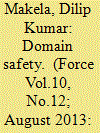

|
|
|
|
|
| Publication |
2012.
|
| Summary/Abstract |
The stage for the cyber war has already been set, albeit secretly. In the last two months, the revelations made by the US' ex-Central Intelligence Agency employee, Edward Snowden, in various interviews to The Guardian newspaper, revealed that the US' intelligence organisation, National Security Agency (which had launched the top-secret PRISM programme) was snooping on personal data of individuals and governments in the US and across the world through the internet. He also revealed that the National Security Agency (NSA) intercepted a big chunk of sensitive information that belongs to India by spying on the embassies and their diplomatic missions. And perhaps the most daunting revelation was that the information sharing between the intelligence agencies of various countries, such as the US and the UK, is already underway.
|
|
|
|
|
|
|
|
|
|
|
|
|
|
|
|
| 3 |
ID:
101050
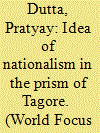

|
|
|
| 4 |
ID:
130989
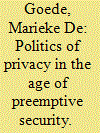

|
|
|
|
|
| Publication |
2014.
|
| Summary/Abstract |
In August 2013, a report was leaked to the Washington Post in which it was revealed that the US National Security Agency (NSA) violated its own privacy rules 2,776 times over a one-year period (Gellman 2013). The privacy violations documented in the report range from technical errors to serious violations such as operations without consent from the Foreign Intelligence and Surveillance (FISA) court and breach of the five-year data retention period. Other breaches are described as "broad syntax" errors, which are related to imprecise queries. This type of fault is presumed reducible "if analysts had more complete and consistent information available about … targets."1 Following the recent disclosures concerning the NSA's PRISM program, which has the capacity to search and connect numerous social network databases in the name of security, the importance of the publication of this privacy report cannot be overestimated. While much of the public discussion concerning PRISM has so far focused on the person of Edward Snowden and his unlikely journeys to Hong Kong and Russia, relatively few questions have been raised about the value and legitimacy of the PRISM program itself. The Washington Post revelations concerning the NSA privacy breaches have grabbed the headlines and may lead to Congressional Hearings (Blake 2013). As with other security and surveillance programs, privacy is a key anchor for critical questioning and public debate
|
|
|
|
|
|
|
|
|
|
|
|
|
|
|
|
| 5 |
ID:
097286
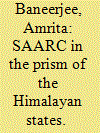

|
|
|
| 6 |
ID:
130991


|
|
|
|
|
| Publication |
2014.
|
| Summary/Abstract |
When US President Barack Obama publicly addressed the data mining and analysis activities of the National Security Agency (NSA), he appealed to a familiar sense of the weighing of the countervailing forces of security and privacy. "The people at the NSA don't have an interest in doing anything other than making sure that where we can prevent a terrorist attack, where we can get information ahead of time, we can carry out that critical task," he stated. "Others may have different ideas," he suggested, about the balance between "the information we can get" and the "encroachments on privacy" that might be incurred (Obama 2013). In many ways, conventional calculations of security weigh the probability and likelihood of a future threat on the basis of information gathered on a distribution of events in the past. Obama's sense of a trading-off of security and privacy shares this sense of a calculation of the tolerance for the gathering of data on past events in order to prevent threats in the future. In fact, though, the very NSA programs he is addressing precisely confound the weighing of probable threat, and the conventions of security and privacy that adhere to strict probabilistic reasoning. The contemporary mining and analysis of data for security purposes invites novel forms of inferential reasoning such that even the least probable elements can be incorporated and acted upon. I have elsewhere described these elements of possible associations, links, and threats as "data derivatives" (Amoore 2011) that are decoupled from underlying values and do not meaningfully belong to an identifiable subject. The analysis of data derivatives for security poses significant difficulties for the idea of a data subject with a recognizable body of rights to privacy, to liberty, and to justice.
Consider, for example, two years before the controversies surrounding NSA and the PRISM program, when the US Director of National Intelligence, James Clapper, testified before the joint hearing of committees on the virtues of the algorithmic piecing together of fragments of data:
|
|
|
|
|
|
|
|
|
|
|
|
|
|
|
|
| 7 |
ID:
106207
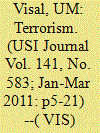

|
|
|
|
|
|
|
|